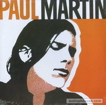
Paul Martin: Paul Martin (Distortions)
If finding brings joy, then seeking permits that beguiling whisper of reward. Paul Martin's extremely select excursions into the vinyl wasteland are alluring items of suitable cachet, Two singles in '66 and '67, then not a whisper till 1996 when Distortions issued an album, limited to 1000 units, compiling these and fifteen other lost songs culled from acetates and four track demos.
It proved to be an Aladdin's Cave of well-crafted garage pop; the ripples it created quickly vanished, and the record is now sadly deleted. Martin was born Paul Myerberg in Manhattan in the mid-1940s. Like many boys with guitars in their hands and songs in their hearts, he began recording in the mid-'60s at Tower Studios in midtown Manhattan. The coffee house circuit and the beat invasion from Britain are strongly reflected in these early outpourings, which have an immediacy and verve sadly lacking in much of the material that made it onto vinyl. It was during these sessions that Martin encountered Herb Ostrow, who liked his work enough to offer to release a single.
"It Happened" is a dirty collision between Garage and Northern Soul that still retains an uncanny energy and freshness. Released on Ostrow's Philadelphia-based Impex label, it received air play on WLS Chicago, but quickly fell victim to the usual realities of distribution difficulties and a distinct lack of publicity. Now a much-desired trophy for Garage purists, it is a minor gem from a long-gone time, a proof perfect that simple means can create something that retains a great and lasting aura of excellence.
Martin followed this with "The Last Remains of Our Love," another slab of garage pop but in more of a ballad setting. This was released on his own Rodin label, and sported a picture sleeve. He even produced two promotional films to accompany both sides of the single, early videos in which he is lip syncing among an array of flashing lights. All this valiant effort generated little response, and the single proved to be his last.
From 1968 to '70 he worked as a recording engineer at Bell Sound, where he continued to record demos till his move to Southern California, eventually settling in Los Angeles, where he worked in set design and began writing screenplays. These new professions remain his widely respected work today.
Success is no guarantee of quality, nor quality any assurance of reward. Paul Martin had the songs, but not the breaks. These simply didn't materialize. He was a marketable commodity, resembling a cross between Eric Anderson and the late Jeff Buckley; he should and could have made a bigger splash. That he didn't is now a small cul de sac of might-have-been.
As Paul Myerberg, he plied his talent in other areas, his songs minor footnotes; although unfortunate, this is a far from unique fate. In these more technical times, one still cannot help admiring the quality of Martin's four-track wonders. Simple and assured, they deserve that small trip into the digital age, because they possess a quality which can fairly surpass better known, more revered artifacts of their era. If music matters at all, it is because the pleasure it can provide deserves to be shared.
These songs are one such instance, albeit a beguilingly obscure one. This scrapbook album is akin to finding a long-forgotten bottle of wine in a disused cellar. Although you weren't present when it was made, you can at least enjoy its qualities in the present day.
